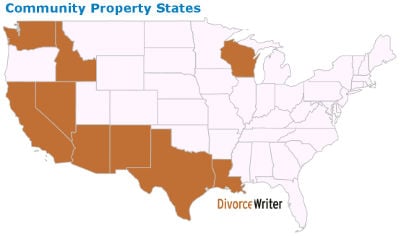Who Gets What in a Divorce?
Community Property, Separate Property, and Equitable Distribution in Divorce

What is Community Property?
Community property is any property (real estate and personal property) the couple acquired during marriage, with some exceptions. In community property states, each spouse has an automatic 50% interest or ownership in such property. It makes no difference whose income paid for it, whose name is on the title, contract, or account (or even whether the account was a single account or a joint account). Examples of community property include:
- Income from employment (including wages, salaries, tips and overtime);
- Real estate;
- Vehicles;
- Contributions to pensions, 401K, or other retirement accounts;
- Unemployment and payment for lost wages; lottery winnings;
- Business interests;
- Tangible items such as furniture; and
- Money in checking and savings accounts.
"Separate Property" Exceptions
There are a few items of property that are not considered marital community property in a community property state. Generally, these separate property exceptions are:
- Anything one spouse owned before the marriage or acquired after the couple separated.
- Gifts or inheritances received by one of the spouses that was deposited into an account held only by that spouse.
- Property received by one of the spouses as a gift or inheritance as long as it was held in that spouse’s name only and kept separate from all of the other marital property.
Generally, separate property is not divided during divorce because each spouse just keeps his or her own separate property.
Community Debts
Community debts are all debts incurred by one or both parties to the marriage from the date of marriage to the date of separation. Both spouses are responsible for the debts and liabilities, again, regardless of which spouse created the debt, or whose name is on the title, note, or bill. Examples of community debts are: balances on vehicle loans, mortgages, credit card balances, personal loans; student loans, medical bills, unpaid taxes, and other liabilities.
How are Community Property and Debts Divided in Divorce?
Community property and debts are usually divided equally (50/50) between the spouses. However, this equal division may not always mean a physical division. For example, the court may award each spouse personal property, assets, and debts whose worth adds up to his or her percentage.
| Community Property State | Additional Exceptions to Community Property and/or Debts |
|---|---|
| Arizona |
|
| California |
|
| Idaho |
|
| Louisiana | The following are considered separate property:
|
| Nevada | Property acquired by either spouse from a gift, bequest, devise, descent or by an award for personal injury damages, with the rents, issues and profits thereof, is considered separate property. Nevada Revised Statutes 123.130. |
| New Mexico | Property is designated as separate property if it is through a written agreement between the spouses, including a deed or other written agreement concerning property held by the spouses as joint tenants or tenants in common in which the property is designated as separate property. New Mexico Statutes, Section 40-3-8. |
| Texas |
|
| Washington |
|
| Wisconsin |
|
How is property divided in the rest of the states?
The rest of the states not on this list do not have community property laws. In these states, the property acquired during the marriage belongs to the spouse who earned it. When divorcing, the courts divide the property according to the concept of "Equitable Distribution," which means that property is distributed or divided equitably between each spouse. This doesn’t mean that each person will receive an equal share. There is no hard and fast rule in deciding who receives what or how much. In uncontested divorces, the spouses reach an agreement as to which spouse receives what property. In contested divorces, a judge may order a spouse to transfer separate property to his or her spouse to make the settlement fair for both spouses.
| Alaska | Alaska is a state where the court usually divides property according to Equitable Distribution. However, Alaska adopted the Community Property Act in 1998, allowing a couple the choice of dividing their property according to the Community Property Act instead of Equitable Distribution. If the couple wants to divide their property under the Community Property Act, they determine what property is to be considered community property and what property is to be considered separate property by executing a Community Property Agreement or a Community Property Trust. When the couple divorces, the courts then divide the property according to the Community Property Agreement, instead of Equitable Distribution. |
